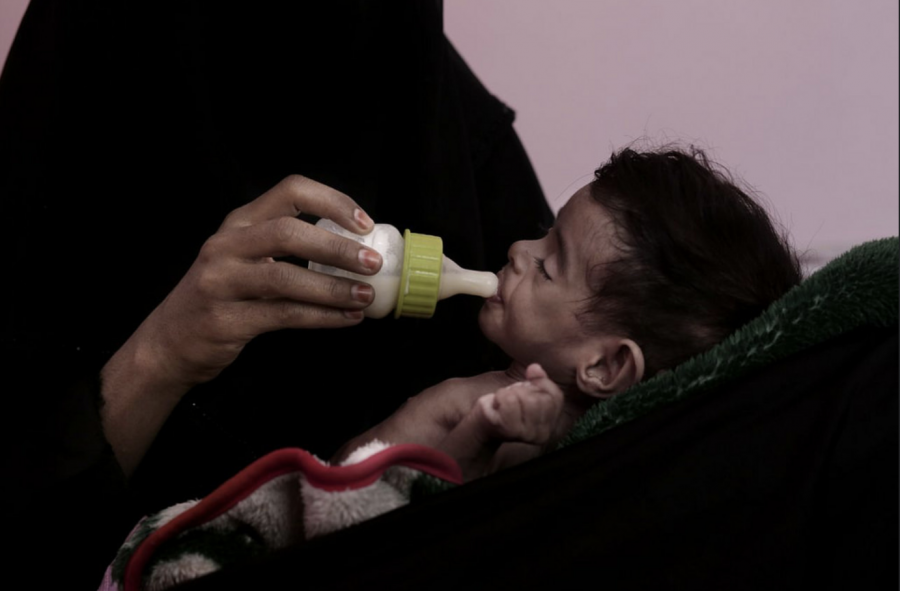The Yemeni Civil War: How Many More Lives is Too Many?
March 1, 2019
Across the world, many noteworthy events go unreported. From a realistic perspective, this is expected; after all, most Americans (even college-educated ones) do not know fundamental facts about immigration, the global economy, and international organizations like NATO and the UN. Americans neither know about nor care for the affairs of foreign countries, despite the country’s heritage as a melting pot of immigrants. As the United States has industrialized and developed, these problems have worsened; its citizens have grown detached from the problems that confront millions of fellow human beings on a daily basis. The increasing adoption in recent years of an isolationist view of its position in the world conflicts with the country’s roots and proves especially shortsighted given the current political strife that engulfs the world now that the former beacon of liberty has begun to condone violence. In particular, the United States’ blatant support of Saudi Arabia in the four-year-long Yemeni Civil War demonstrates the extent to which the country has sacrificed common notions of morality and human dignity in order to preserve its own interests.
In March 2015, long-simmering conflicts prompted the start of a catastrophe that has left ¾ of Yemen’s 28 million people suffering, with 8 million threatened with starvation, and more than a million suffering from cholera, a disease many considered relegated to the nineteenth century. Following the 2011 Arab Spring that riveted North Africa and the Middle East, encouraging more democracy and transparency among corrupt governments, authoritarian Yemeni president Ali Abdullah Saleh was ousted in favor of his successor, Abdrabbuh Mansour Hadi, who was inaugurated president of a country embroiled in high unemployment, the authoritarian regime of which had masked internecine conflicts between Shia and Sunni Muslims. Compounding the situation was the emergence of radical groups, foremost among them Al-Qaeda and the Islamic State. Taking advantage of the political vacuum created in the midst, Zaidi Shia Houthis took control of regions of Northern Yemen beginning in 2011 and, by 2014, had captured Yemen’s capital, Sanaa. In an attempt to reinstate Hadi’s government, Sunni Saudi Arabia, with the support of the United Kingdom, France, United States, and many other Middle Eastern States, instituted a naval blockade in March of 2015, unleashing the fury that would characterize the war.
Quickly the war positioned itself as a war between contrasting ideologies, Shiite and Sunni. Saudi Arabia’s declared motivation for the blockade and subsequent bombing spree (using weapons originated from American weapons deals) was to curtail Iranian shipment of weapons that would have aided the Houthi rebels. Fearful of expanded Iranian influence following the Iran Nuclear Deal, major European powers and the US supported the KSA, in spite of the Crown Prince’s insidious role in murdering political dissidents and the country’s induced famine of Yemen. The United States’ involvement, rather than dwindling, has ramped up: the country has provided Saudi Arabia with a state-of-the-art missile defense system, bombs, and F-15 fighter jets. These American bombs have killed civilians, including 40 schoolchildren in one occasion and 155 funeral-goers in another, and contributed to the killing of 4,000 other civilians by the end of Obama’s tenure in office.
On a geopolitical level, the war poses a severe threat to the rest of the world. Blocking the connection between the Red Sea and the Indian Ocean, the war has stunted the trade of oil. Meanwhile, the Houthi insurgency has allowed extremists to gain ground; as Yemenis endure the constant onslaught of Western bombs, they turn more to extremism and Iran. Nevertheless, the largest crisis is the humanitarian one. As Americans sit idly by, millions of Yemenis are denied access to the foreign world, entrapping them in a nation deprived of food and basic medical care. Access to clean water and sanitation have deteriorated, enabling the spread of cholera and other infectious diseases. Most concerning, however, is the fact that Americans are complicit in their support of the murderous regime of the KSA that preys on the most innocent. Americans possess a moral imperative to urge their lawmakers to oppose Saudi Arabia’s indiscriminate bombing tactic or they will risk further bloodying their hands by engineering the largest famine in the past one hundred years.
Sources:
https://drive.google.com/file/d/0B2AUpoucQL4jQXhzOWt4QjBfMFk/view
https://www.bbc.com/news/world-middle-east-29319423
http://time.com/4874345/yemen-cholera-outbreak/


